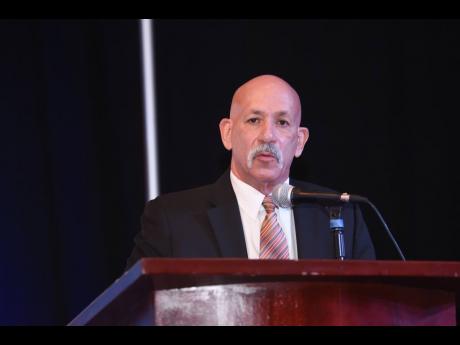Private security companies gear for possible job losses
Rumours of industrial action make round in social media
JAMAICA’s private-security companies could soon start feeling the aftershocks of the Supreme Court ruling that guards are employees and not contractors.
Security guards are riled by the silence of their employers since the September 23 ruling that their peers working with Marksman Security Limited are employees, not independent contractors, adding that the company should immediately begin paying over their three per cent National Housing Trust (NHT) statutory contributions.
Amid threats of industrial action by guards making the rounds on social media, the CEO of a prominent security firm told The Gleaner the court ruling could also trigger a massive migration from the industry should a 40-hour work week be instituted, replacing the 60 hours guards now work.
“The entire industry, possibly the third-biggest employer of labour in this country, will soon be hit by crises as the ruling not only stated that companies should now start matching the guards’ NHT contributions, but that they are also employees, who, by Jamaica’s labour laws, should work a 40-hour week with anything after that being overtime, the CEO pointed out.
“We already operate on a nominal margin and will have to pass on the three per cent NHT cost to struggling clients, businesses yet to recover from the COVID-19 pandemic. Even if some clients accept the increased rates, none, especially government, will not pay time-and-a-half in overtime for the additional four hours per day that guards now work in a 60-hour week,” he added, predicting security firms exiting the industry and a gradual lowering of standards after what president of the Jamaica Society for Industrial Security (JSIS), Lieutenant Commander George Overton said will be “transition into full compliance of the reclassification early next year”.
GO ON STRIKE
Lieutenant Commander Overton said he was aware of a group on social media encouraging guards to go on strike, but said he doesn’t believe it will be widespread if it happens.
“I don’t know how much traction it has been able to pull together, but nothing has been said formally. I don’t think it is going to be as widespread as it is being made out to be but you never know,” Overton said in a radio interview on Friday.
Meanwhile, the security-company CEO, who requested anonymity to protect the relationship his firm shares with its guards, explained the financial impact the ruling will have on their livelihoods.
“Imagine a security guard earning the government-stipulated minimum wage of $262.50 per hour in a 40-hour work week. That’s $10,500, plus $1,904.80 for laundry. After deductions, without the additional 20 hours they now work, what do you think will happen?
“No guard will want to work for $12,000 per week, minus deductions, plus you can expect clients to reduce the number of guards required, especially armed personnel, who come at a higher rate. The spinoff from this will be established security firms being shuttered and a rise in fly-by-night entities popping up, offering shoddy services in an era of increased murders and robberies committed with the use of firearms.”
Some guards, he added, will look to the auxiliary arm of the Jamaica Constabulary Force for employment as district constables, or possibly the military, but most could end up joining the informal sector with their replacements coming into the industry lacking experience and with possibly spotty backgrounds.
Meanwhile, Overton has described any form of industrial action as “unwise” and “aggravating the situation”.
“Withdrawing your service at this time would be unwise. You already have clients facing significant increases in cost. To aggravate the situation by withdrawing service would certainly add insult to injury,” he said.
JASIS is hoping government lends its ears to a proposed moratorium on all employee statutory contributions, an immediate enactment of legislation to change the workweek from 40 to 60 hours and establishment of a worker category known as dependent contractor, a hybrid arrangement that includes specific benefits.

